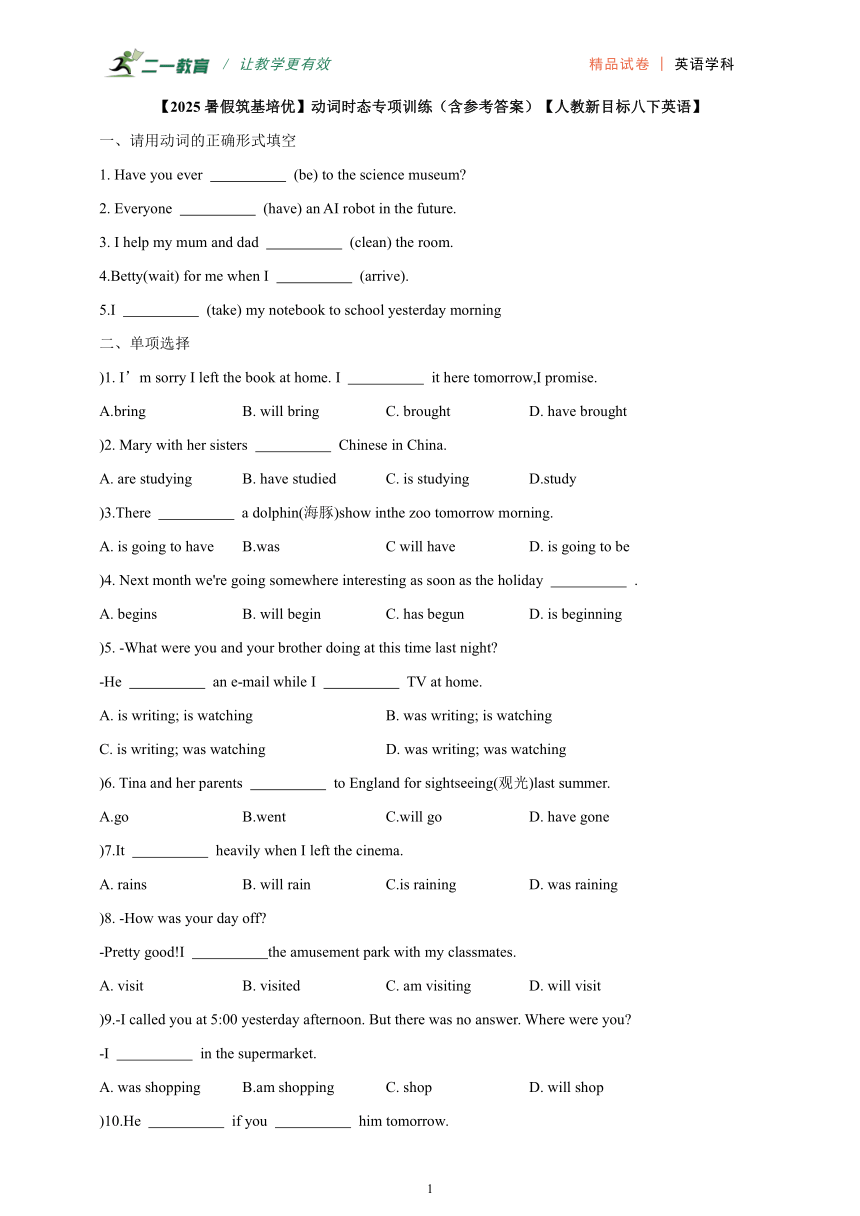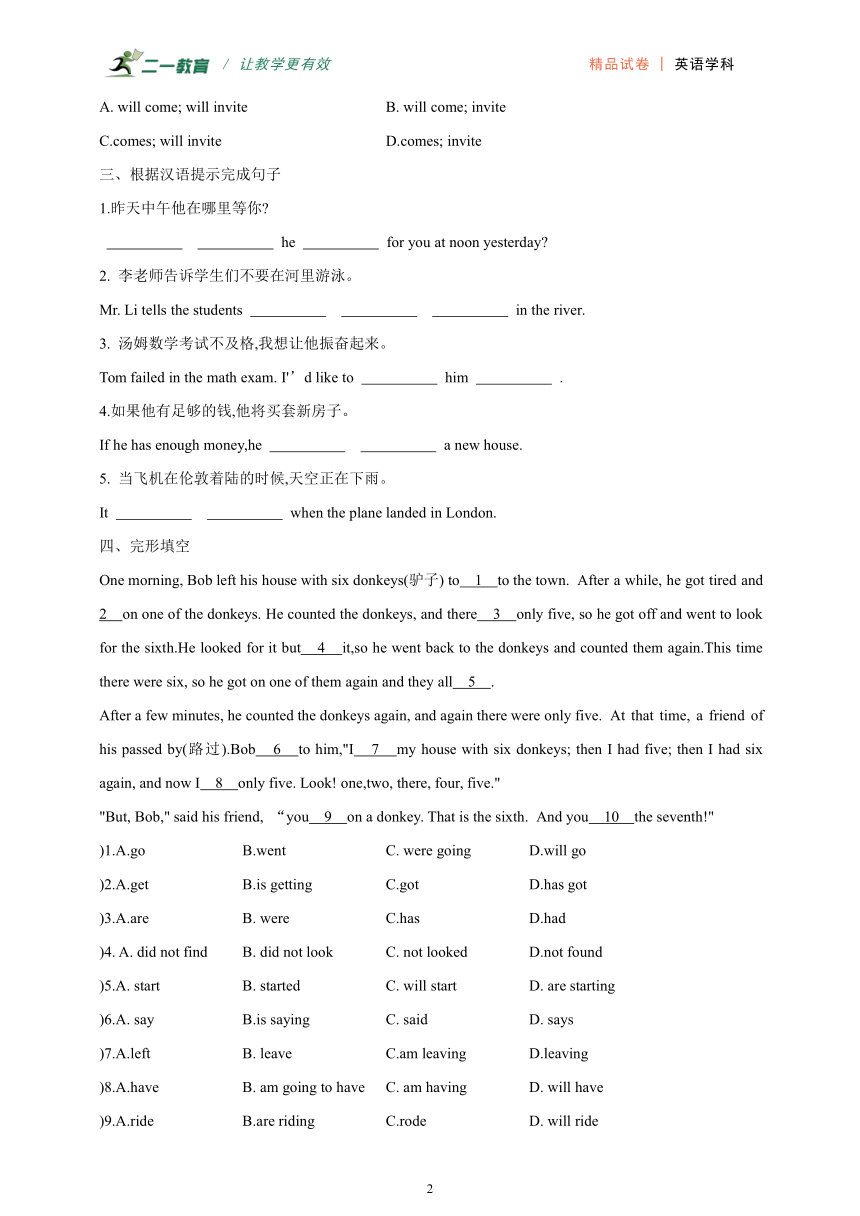【2025暑假筑基培优】动词时态专项训练(含参考答案)【人教新目标八下英语】
文档属性
| 名称 | 【2025暑假筑基培优】动词时态专项训练(含参考答案)【人教新目标八下英语】 |  | |
| 格式 | docx | ||
| 文件大小 | 276.9KB | ||
| 资源类型 | 试卷 | ||
| 版本资源 | 人教新目标(Go for it)版 | ||
| 科目 | 英语 | ||
| 更新时间 | 2025-07-06 08:02:59 | ||
图片预览


文档简介
/ 让教学更有效 精品试卷 | 英语学科
【2025暑假筑基培优】动词时态专项训练(含参考答案)【人教新目标八下英语】
一、请用动词的正确形式填空
1. Have you ever (be) to the science museum
2. Everyone (have) an AI robot in the future.
3. I help my mum and dad (clean) the room.
4.Betty(wait) for me when I (arrive).
5.I (take) my notebook to school yesterday morning
二、单项选择
)1. I’m sorry I left the book at home. I it here tomorrow,I promise.
A.bring B. will bring C. brought D. have brought
)2. Mary with her sisters Chinese in China.
A. are studying B. have studied C. is studying D.study
)3.There a dolphin(海豚)show inthe zoo tomorrow morning.
A. is going to have B.was C will have D. is going to be
)4. Next month we're going somewhere interesting as soon as the holiday .
A. begins B. will begin C. has begun D. is beginning
)5. -What were you and your brother doing at this time last night
-He an e-mail while I TV at home.
A. is writing; is watching B. was writing; is watching
C. is writing; was watching D. was writing; was watching
)6. Tina and her parents to England for sightseeing(观光)last summer.
A.go B.went C.will go D. have gone
)7.It heavily when I left the cinema.
A. rains B. will rain C.is raining D. was raining
)8. -How was your day off
-Pretty good!I the amusement park with my classmates.
A. visit B. visited C. am visiting D. will visit
)9.-I called you at 5:00 yesterday afternoon. But there was no answer. Where were you
-I in the supermarket.
A. was shopping B.am shopping C. shop D. will shop
)10.He if you him tomorrow.
A. will come; will invite B. will come; invite
C.comes; will invite D.comes; invite
三、根据汉语提示完成句子
1.昨天中午他在哪里等你
he for you at noon yesterday
2. 李老师告诉学生们不要在河里游泳。
Mr. Li tells the students in the river.
3. 汤姆数学考试不及格,我想让他振奋起来。
Tom failed in the math exam. I'’d like to him .
4.如果他有足够的钱,他将买套新房子。
If he has enough money,he a new house.
5. 当飞机在伦敦着陆的时候,天空正在下雨。
It when the plane landed in London.
四、完形填空
One morning, Bob left his house with six donkeys(驴子) to 1 to the town. After a while, he got tired and 2 on one of the donkeys. He counted the donkeys, and there 3 only five, so he got off and went to look for the sixth.He looked for it but 4 it,so he went back to the donkeys and counted them again.This time there were six, so he got on one of them again and they all 5 .
After a few minutes, he counted the donkeys again, and again there were only five. At that time, a friend of his passed by(路过).Bob 6 to him,"I 7 my house with six donkeys; then I had five; then I had six again, and now I 8 only five. Look! one,two, there, four, five."
"But, Bob," said his friend, “you 9 on a donkey. That is the sixth. And you 10 the seventh!"
)1.A.go B.went C. were going D.will go
)2.A.get B.is getting C.got D.has got
)3.A.are B. were C.has D.had
)4. A. did not find B. did not look C. not looked D.not found
)5.A. start B. started C. will start D. are starting
)6.A. say B.is saying C. said D. says
)7.A.left B. leave C.am leaving D.leaving
)8.A.have B. am going to have C. am having D. will have
)9.A.ride B.are riding C.rode D. will ride
)10.A. will be B.were C.be D.are
五、阅读理解
In some Western countries, many children do chores to get pocket money(零花钱). They usually start to do this when they are ten years old.
School students have to do homework and study for tests.They don't have much free time on weekdays. They often do chores on weekends.
Young kids only do easy chores. So they don't get much money. But that's enough. Many of them only want to buy candy(糖果). And candy is cheap!They often help do the dishes, sweep the floor, or feed the pet cat or dog.
When they get older, they want to buy more and more things.They want things that are more expensive than candy. So they have to work harder! They often help their parents wash the family car, cut the grass, or cook meals.
Some jobs are a good way for kids to learn new things. For example, they can learn how to use a lawnmower(割草机) or how to cook. Of course, their parents help them at first.
)1. How do many children get pocket money in some Western countries
A. They study hard. B. They do chores.
C. They do part-time jobs. D.They ask their parents for it.
)2. When do many children usually begin to do chores in some Western countries
A. At the age of 10. B. At the age of 13. C. At the age of 15. D. At the age of 17.
)3. Mary wants to get more pocket money to buy something expensive. She may .
A. do the dishes B. feed the pet cat C. cook meals D. sweep the floor
)4. Which of the following is NOT true
A. Young kids do easy chores because they can get much money from their parents.
B. School students often do chores on Saturdays and Sundays.
C. If kids get older and want something nore expensive they have to work harder.
D. Kids can learn how to cook with the help of their parents.
) 5. The passage mainly tells us how children in some Western countries .
A.find jobs B. get pocket money C. study at school D.do chores
参考答案
一、1.been 2. will have 3.(to)clean 4. was waiting;arrived
5.took
二、1.B 2.C3.D4.A 5.D 6.B7.D 8.B9.A10.B
三、1.Where did;wait 2. not to swim 3.cheer;up 4.will buy
5. was raining
四、1.A 2.C3.B4.A 5.B 6.C 7.A 8.A9.B10.D
五、1.B 2.A3.C4.A5.B
【2025暑假筑基培优】动词时态专项训练(含参考答案)【人教新目标八下英语】
一、请用动词的正确形式填空
1. Have you ever (be) to the science museum
2. Everyone (have) an AI robot in the future.
3. I help my mum and dad (clean) the room.
4.Betty(wait) for me when I (arrive).
5.I (take) my notebook to school yesterday morning
二、单项选择
)1. I’m sorry I left the book at home. I it here tomorrow,I promise.
A.bring B. will bring C. brought D. have brought
)2. Mary with her sisters Chinese in China.
A. are studying B. have studied C. is studying D.study
)3.There a dolphin(海豚)show inthe zoo tomorrow morning.
A. is going to have B.was C will have D. is going to be
)4. Next month we're going somewhere interesting as soon as the holiday .
A. begins B. will begin C. has begun D. is beginning
)5. -What were you and your brother doing at this time last night
-He an e-mail while I TV at home.
A. is writing; is watching B. was writing; is watching
C. is writing; was watching D. was writing; was watching
)6. Tina and her parents to England for sightseeing(观光)last summer.
A.go B.went C.will go D. have gone
)7.It heavily when I left the cinema.
A. rains B. will rain C.is raining D. was raining
)8. -How was your day off
-Pretty good!I the amusement park with my classmates.
A. visit B. visited C. am visiting D. will visit
)9.-I called you at 5:00 yesterday afternoon. But there was no answer. Where were you
-I in the supermarket.
A. was shopping B.am shopping C. shop D. will shop
)10.He if you him tomorrow.
A. will come; will invite B. will come; invite
C.comes; will invite D.comes; invite
三、根据汉语提示完成句子
1.昨天中午他在哪里等你
he for you at noon yesterday
2. 李老师告诉学生们不要在河里游泳。
Mr. Li tells the students in the river.
3. 汤姆数学考试不及格,我想让他振奋起来。
Tom failed in the math exam. I'’d like to him .
4.如果他有足够的钱,他将买套新房子。
If he has enough money,he a new house.
5. 当飞机在伦敦着陆的时候,天空正在下雨。
It when the plane landed in London.
四、完形填空
One morning, Bob left his house with six donkeys(驴子) to 1 to the town. After a while, he got tired and 2 on one of the donkeys. He counted the donkeys, and there 3 only five, so he got off and went to look for the sixth.He looked for it but 4 it,so he went back to the donkeys and counted them again.This time there were six, so he got on one of them again and they all 5 .
After a few minutes, he counted the donkeys again, and again there were only five. At that time, a friend of his passed by(路过).Bob 6 to him,"I 7 my house with six donkeys; then I had five; then I had six again, and now I 8 only five. Look! one,two, there, four, five."
"But, Bob," said his friend, “you 9 on a donkey. That is the sixth. And you 10 the seventh!"
)1.A.go B.went C. were going D.will go
)2.A.get B.is getting C.got D.has got
)3.A.are B. were C.has D.had
)4. A. did not find B. did not look C. not looked D.not found
)5.A. start B. started C. will start D. are starting
)6.A. say B.is saying C. said D. says
)7.A.left B. leave C.am leaving D.leaving
)8.A.have B. am going to have C. am having D. will have
)9.A.ride B.are riding C.rode D. will ride
)10.A. will be B.were C.be D.are
五、阅读理解
In some Western countries, many children do chores to get pocket money(零花钱). They usually start to do this when they are ten years old.
School students have to do homework and study for tests.They don't have much free time on weekdays. They often do chores on weekends.
Young kids only do easy chores. So they don't get much money. But that's enough. Many of them only want to buy candy(糖果). And candy is cheap!They often help do the dishes, sweep the floor, or feed the pet cat or dog.
When they get older, they want to buy more and more things.They want things that are more expensive than candy. So they have to work harder! They often help their parents wash the family car, cut the grass, or cook meals.
Some jobs are a good way for kids to learn new things. For example, they can learn how to use a lawnmower(割草机) or how to cook. Of course, their parents help them at first.
)1. How do many children get pocket money in some Western countries
A. They study hard. B. They do chores.
C. They do part-time jobs. D.They ask their parents for it.
)2. When do many children usually begin to do chores in some Western countries
A. At the age of 10. B. At the age of 13. C. At the age of 15. D. At the age of 17.
)3. Mary wants to get more pocket money to buy something expensive. She may .
A. do the dishes B. feed the pet cat C. cook meals D. sweep the floor
)4. Which of the following is NOT true
A. Young kids do easy chores because they can get much money from their parents.
B. School students often do chores on Saturdays and Sundays.
C. If kids get older and want something nore expensive they have to work harder.
D. Kids can learn how to cook with the help of their parents.
) 5. The passage mainly tells us how children in some Western countries .
A.find jobs B. get pocket money C. study at school D.do chores
参考答案
一、1.been 2. will have 3.(to)clean 4. was waiting;arrived
5.took
二、1.B 2.C3.D4.A 5.D 6.B7.D 8.B9.A10.B
三、1.Where did;wait 2. not to swim 3.cheer;up 4.will buy
5. was raining
四、1.A 2.C3.B4.A 5.B 6.C 7.A 8.A9.B10.D
五、1.B 2.A3.C4.A5.B
同课章节目录
